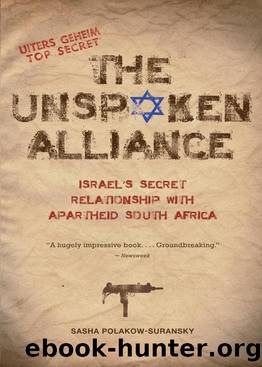The Unspoken Alliance: Israel's Secret Relationship With Apartheid South Africa by Sasha Polakow-Suransky

Author:Sasha Polakow-Suransky [Polakow-Suransky, Sasha]
Language: eng
Format: azw3, mobi
Tags: Israel & Palestine, Republic of South Africa, Modern, Africa, General, Middle East, 20th Century, South, History
ISBN: 9780307379252
Publisher: Knopf Doubleday Publishing Group
Published: 2010-05-25T04:09:52.441911+00:00
10
LOSING THE LEFT
Israel, Apartheid, and the Splintering of the Civil Rights Coalition
IN EARLY 1968, just months before his death, the Reverend Martin Luther King Jr. declared to a Harvard University audience: âWhen people criticize Zionists, they mean Jews. Youâre talking anti-Semitism.â At the time, Israel was still a popular left-wing cause in the United States and relations between blacks and Jews were at their pinnacle. The civil rights coalition of the 1960s had a distinguished Jewish pedigree: Rabbi Emil Hirsch had helped found the NAACP, and Joel Spingarn, a Columbia professor involved in the civil rights movement, became its president in 1914. During the 1930s, the Chicago businessman Julius Rosenwald bankrolled the expansion of black education in the South in the face of opposition from the Klan, and in the 1960s the renowned rabbi and philosopher Abraham Joshua Heschel had marched arm in arm with King in Selma. When Thurgood Marshall became the first black justice on the Supreme Court in 1967, the Jewish attorney Jack Greenberg replaced him as head of the NAACPâs Legal Defense Fund.1
Indeed, the American left that today almost uniformly denounces Israel was once one of its greatest proponents. In the 1930s, black Americans saw Hitler as another white-robed Klansman and spoke out forcefully against Nazism. The Baltimore-based newspaper Afro-American declared in 1933, âGermany is doing to its Jewish people what the South does to the negro,â under the headline âAdolph Hitler, K.K.K.â2 During the early 1940s, the civil rights leader Adam Clayton Powell Jr. raised $150,000 for the Irgun, which he proudly described as âan underground terrorist organization in Palestine.â3 And Freda Kirchwey, the editor of the quintessential left-wing magazine The Nation, was instrumental in lobbying the Truman administration to recognize a Jewish state in Palestine.
Kirchwey was a scion of the New York liberal intelligentsia; her father served as dean of Columbia Law School and, after becoming editor of The Nation in 1933, she used her magazine to promote the New Deal and the antifascist struggle in Spain. As the debate over the future of Palestine reached its climax in 1947, Kirchwey and her colleagues prepared influential briefing papers backing Jewish statehood and distributed thousands of copies to U.N. delegations, members of Congress, State Department officials, and leading media personalities. They rejected calls for a binational state and aggressively promoted partition as the only solution. Relying on leaks from the State Department, The Nation revealed the Palestinian leader Grand Mufti Haj Amin al-Husseiniâs wartime ties to the Nazis, embarrassing several Arab representatives at the U.N. Kirchweyâs report found its way to President Harry Trumanâs desk and Zionist leaders credited her in no small measure with influencing his decision to recognize Israel on May 14, 1948.4
The leftâs honeymoon with Israel would last for over two decades, but by 1967 the bliss was fading. Even as Arab countries, the Soviet Union, and many left-wing groups in the United States and Europe began to cast Israel as an occupying imperial power in the wake of the Six-Day War,
Download
The Unspoken Alliance: Israel's Secret Relationship With Apartheid South Africa by Sasha Polakow-Suransky.mobi
This site does not store any files on its server. We only index and link to content provided by other sites. Please contact the content providers to delete copyright contents if any and email us, we'll remove relevant links or contents immediately.
| Central Africa | East Africa |
| North Africa | Southern Africa |
| West Africa | Algeria |
| Egypt | Ethiopia |
| Kenya | Nigeria |
| South Africa | Sudan |
| Zimbabwe |
Goodbye Paradise(2966)
Men at Arms by Terry Pratchett(2407)
Tobruk by Peter Fitzsimons(2062)
Pirate Alley by Terry McKnight(1910)
Arabs by Eugene Rogan(1836)
Borders by unknow(1788)
Belonging by Unknown(1467)
The Biafra Story by Frederick Forsyth(1324)
It's Our Turn to Eat by Michela Wrong(1303)
Botswana--Culture Smart! by Michael Main(1238)
A Winter in Arabia by Freya Stark(1225)
Gandhi by Ramachandra Guha(1196)
Coffee: From Bean to Barista by Robert W. Thurston(1181)
Livingstone by Tim Jeal(1152)
The Falls by Unknown(1142)
The Source by James A. Michener(1135)
The Shield and The Sword by Ernle Bradford(1101)
Egyptian Mythology A Fascinating Guide to Understanding the Gods, Goddesses, Monsters, and Mortals (Greek Mythology - Norse Mythology - Egyptian Mythology) by Matt Clayton(1088)
Africa: Altered States, Ordinary Miracles by Richard Dowden(1078)
